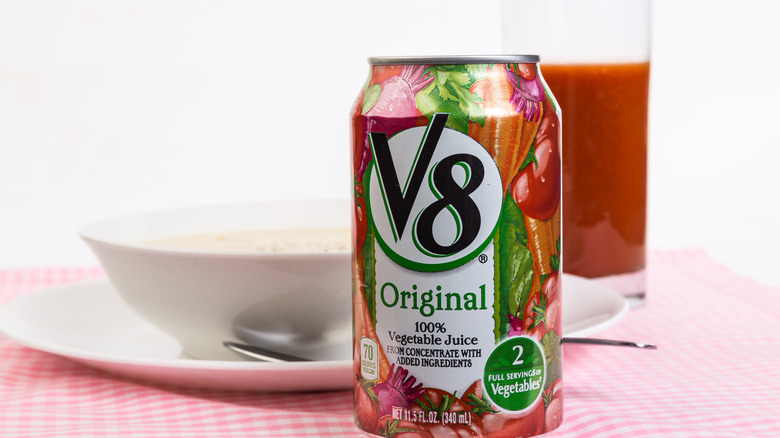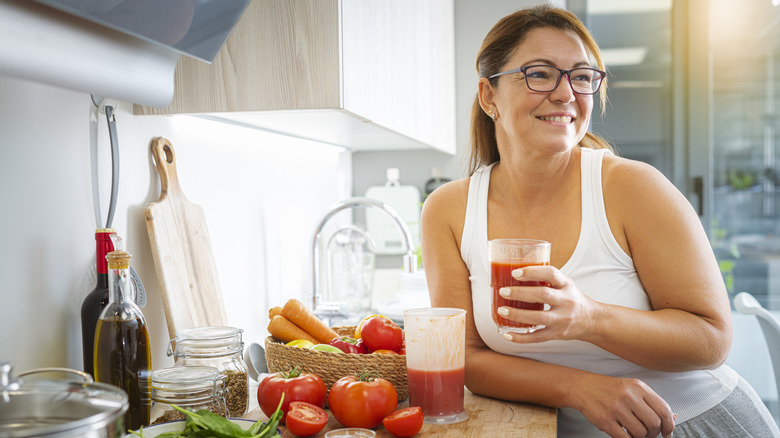Can V8 Juice Interact With Your Medications?
V8 allows you to drink your vegetables, and a single 8-ounce serving provides two servings of vegetables. It's also low in calories, fat-free, and cholesterol-free. You get a healthy dose of vitamin A and 80% of your daily vitamin C. V8 might be your go-to option for a nutritious beverage to take your medications, but certain medications can interact with some foods and drinks.
A prime example is grapefruit juice. According to the U.S. Food & Drug Administration, certain medications such as cholesterol-lowering statins, anti-anxiety drugs, and corticosteroids can't be taken with grapefruit juice because the juice allows more of the medication to get into your body. With too much of your drug in your system at once, you could experience more side effects. Some drugs could cause liver or muscle damage if you take them with grapefruit juice.
But what about V8 juice? A 2017 article in the Asian Journal of Pharmaceutical Sciences found that tomato juice, which serves as the base of V8 juice, can work in the same way on the body as grapefruit juice in terms of medication. However, it depends on the specific medication.
V8 might affect how your body metabolizes a certain drug
According to the FDA, the CYP3A4 enzyme in your small intestine typically breaks down your medication. Grapefruit juice prevents this enzyme from doing its job, so more of your medication gets into your blood at a given time and stays there. Seville oranges, tangelos, and pomelos could also block this enzyme.
The study looked at the effects of both tomato juice and grapefruit juice on how two drugs are processed in the body. Nifedipine is a calcium-channel blocker that treats high blood pressure, and midazolam is a sedative that slows down the nervous system. Both drugs are metabolized by the CYP3A4 enzyme. When rats were given grapefruit juice before taking the drugs, it significantly increased their concentration levels in the blood. Tomato juice also had the same effect on the midazolam but no effect on the nifedipine. The study suggests that, like grapefruit juice, tomato juice can influence how the body handles certain drugs, but the extent of the effect may vary depending on the specific drug.
Other potential effects of V8 on medications
Some fruits, vegetables, and snacks aren't well known for how they might interact with medications, according to AARP. These interactions might be listed on the medication fact sheet, but theyoften get overlooked, especially when you're taking several medications at once.
If you're taking warfarin, vegetables that are high in vitamin K such as spinach, kale, and broccoli could make this drug less effective. V8 lists spinach last on the list of vegetables, and the nutrition label doesn't list vitamin K as a nutrient. V8 has 470 milligrams of potassium, and potassium-rich foods like V8 shouldn't be taken with ACE inhibitors to lower blood pressure. Acidic juices could also make antihistamines and calcium channel blockers less effective. V8 vegetable juice has a pH of 4.29, which is less acidic than orange juice's pH of 3.7 (per New Albany Smiles).
Remember that V8 also has fruit and vegetable blends, so you'll want to be sure to check the ingredients of the blends to see if any of them might interact with your medication. Your doctor or pharmacist can tell you if your medication interacts with V8, grapefruit juice, or other types of juices. You could also check the drug facts or the medication guide that accompanies your prescription.



